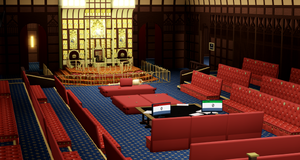House of Lords: Difference between revisions
Jump to navigation
Jump to search
No edit summary |
No edit summary |
||
| Line 21: | Line 21: | ||
| leader1 = [[harrison_nw|The Earl harrison_nw of Liverpool]] | | leader1 = [[harrison_nw|The Earl harrison_nw of Liverpool]] | ||
| party1 = <!-- Lord Speaker --> | | party1 = <!-- Lord Speaker --> | ||
| election1 = | | election1 = 4 February 2023 | ||
| leader2_type = [[Senior Deputy Speaker|Senior Deputy Speaker]] | | leader2_type = [[Senior Deputy Speaker|Senior Deputy Speaker]] | ||
| leader2 = [[Geolyre|The Lord Geolyre of Ipswich]] | | leader2 = [[Geolyre|The Lord Geolyre of Ipswich]] | ||
Revision as of 17:15, 14 May 2023
The Right Honourable the Lords Spiritual and Temporal of the United Kingdom of Great Britain and Northern Ireland in Parliament Assembled | |
|---|---|
 Logo used to represent the House of Lords | |
 Flag of the House of Lords | |
| Type | |
| Type | Upper house of the Parliament of the United Kingdom |
| Leadership | |
The Earl harrison_nw of Liverpool since 4 February 2023 | |
| Structure | |
| Seats | 25 |
 | |
Political groups |
|
Length of term | Peerage held for life |
| Meeting place | |
 | |
| House of Lords Chamber, Palace of Westminster, London, England | |
| Footnotes | |
The House of Lords is the upper house of Parliament. Like the lower house, the House of Commons, it meets in the Palace of Westminster. The Lords is not elected, but it's members are appointed by the Monarch. Members appointed are usually on recommendation of the House of Lords Appointments Commission and have lots of experience.
The House of Lords holds the government, and parliament, to account by scrutinising bills. Peers regularly review and amend bills before they reach Royal Assent, seeking agreement with the House of Commons on the final text.